#pathologization
Text
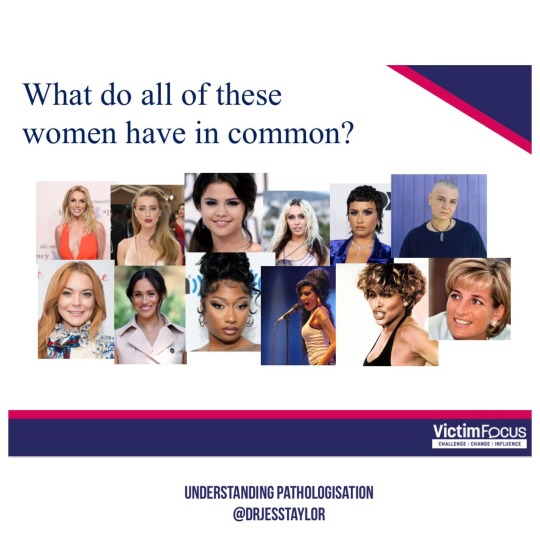
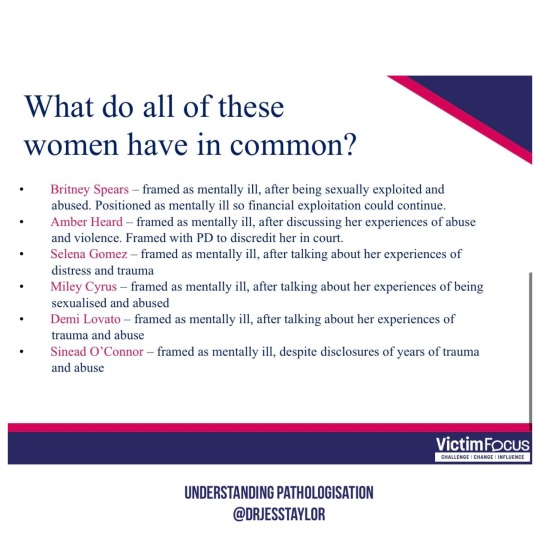
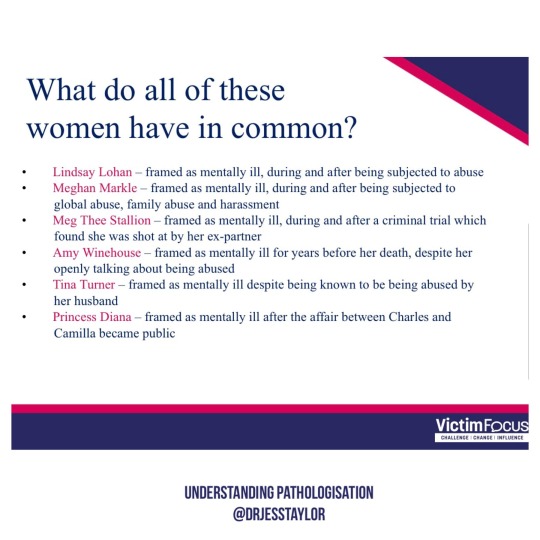
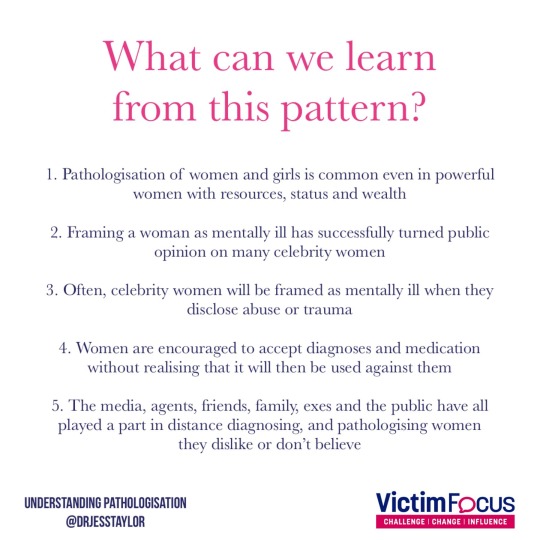
What do Britney Spears, Amber Heard, Selena Gomez, Miley Cyrus, Demi Lovato, Sinead O'Connor, Lindsay Lohan, Meghan Markle, Meg Thee Stallion, Amy Winehouse, Tina Turner, and Princess Diana have in common?
#britney spears#amber heard#selena gomez#miley cyrus#meghan markle#meg thee stallion#demi lovato#sinead o'connor#lindsay lohan#amy winehouse#tina turner#princess diana#i stand with amber heard#pathologisation#pathologization#mental illness#misogyny#smear campaign
1K notes
·
View notes
Text
Please stop pathologizing yourself. You're a human being at the end of the day. Getting so hung up over how you handle your symptoms & whether or not you're "right" or "wrong" to act that way? This only induces more shame, guilt, humiliation, and fosters more resentment for your inner self talk.
There is so much talk in recovery spaces about how to be this perfect idealistic vision of health at every possible stage. But that is not realistic at all. People have trauma. People have mental breakdowns. People have anger and rage and people have to live and go through things before you ever really know what to do with some of this stuff, how to handle it, etc.
At the end of the day, finding solace in your diagnosis can be cathartic, of course. But if you're dragging yourself through the mud because of what you've been handed in life and not knowing how to carry that like the Mona Lisa? Thats causing you more harm & distress than you'd think. Your diagnosis can be helpful for clarifying what's going on up there in the spicy brain noodle shop, but to be completely honest that's about it.
Why?
Well, because you're still you. You're still a human through and through. No matter what you've done on this earth, no matter what you were born with, no matter what you've been through- you deserve to rest easy knowing you're doing the best with what life has given you to work with.
So long as you're not trying to hurt anyone? Or if you're trying to be a little bit better than you were yesterday?
There is no need to further drag yourself down because the spicy brain demons don't dance the way society wants them to.
You don't deserve to suffer for the way society frames this shit. That is one of the best things you can learn how to do, is break free from the constant need to pathologize yourself at every nick and turn. Sometimes you just do stuff because you want to, because you like it, because it's helpful and beneficial to how you live. You don't need to put yourself in a straight jacket for that.
#recovery#ptsd#trauma#mental health#boundaries#healing#mental health discussion#adhd#autism#stigma#npd#bpd#pathologization#self esteem#self love#self care#mental health discourse#cluster b pds#self diagnosis#neurodivergent#neurospicy
98 notes
·
View notes
Text
In the 15 or so years that I’ve been actively involved in neurodivergent/Mad/disabled liberation, my perspective on “overdiagnosis” or “broadening the category of mental illness” has shifted a few times.
At first, I uncritically agreed with what might be called the “mainstream, mad-lite” perspective that “broadening the category of mental illness” was a real thing worth objecting to – that doctors and schools were pathologizing emotions, traits, and behaviors that should rightfully fall under the range of “normal.” How terrible to pathologize grief, we said, when feeling pain and sadness at the loss of a loved one is perfectly normal!
But by 2015, when the New York Times ran an article on pathologizing women’s emotions, I was sharply critical. I wrote this:
This is the kind of thing I would've celebrated a few years ago as a baby neurodiversity activist. But now, please count me as completely over faux-revolutionary assertions that one, specific, particular group of people should not be pathologized. The argument essentially boils down to "Neurotypical women shouldn't be pathologized for being upset, because they have legitimate reason for being upset, unlike all those other hysterical, overreacting people who are upset for no good reason, who really need to be pathologized."
I regard this the same way I do the endless spate of "ADHD isn't a real disease; it's just a label for people who are creative and misunderstood!" articles. No, ADHD isn't a disease, and no, ADHD-type people shouldn't be pathologized, but the emphasis on "isn't a REAL disease" implies "unlike those other neurological differences, which ARE real diseases."
These articles and ideas are not inclusive or neurodiversity-positive. "The line between pathologized and non-pathologized people should be drawn in a different place" is not a radical argument. It serves to throw other pathologized people -- the so-called "actually disordered" or "seriously mentally ill" or "low-functioning" people from whom these arguments are so anxious to distance their subjects -- further under the bus.
Furthermore, because the medical model conflates pathologization with entitlement to services, these arguments often actually throw even the people they argue to depathologize under the bus as well. Extreme emotional states shouldn't be pathologized in women (or in anyone), but many people who experience extreme emotional states choose to use medications or other medical services to manage them -- a choice that should be their right. Depathologization should not be used to deprive them of access to that choice. "You're not defective, so we know what's best for you" isn't actually that big an improvement over "You are defective, so we know what's best for you."
Now, 9 years later in 2024, I still stand by what I said in 2015. Arguing about where to draw the line between pathological and nonpathological, or how wide to make the circle of accepted normalcy, is a pointless and ultimately harmful argument. I have no interest in arguing “This group of people, specifically, shouldn’t be pathologized, because they’re not like that group of people, who should be pathologized.” No one should be pathologized – not the otherwise-neurotypical woman grieving a loss, and not the visibly neurodivergent person responding to stimuli no one else can perceive. We should settle for no less than acceptance for all; pathologization for none.
But I also didn’t quite predict how far pathologization would reach in the following decade.
I was thinking about this because, in a context completely unrelated to disability rights, I was thinking that liberalism as a mainstream ideology barely exists in the U.S. anymore. I expressed some of that concern here. “Freedom of speech, freedom of conscience, and bodily autonomy are generally, in and of themselves, good” is not a particularly mainstream idea.
“But,” you might be thinking, “Aren’t you always saying that liberals who profess to believe those things don’t really believe them, and never have, because they don’t apply them to disabled people, poor people, young people, and other marginalized people?” And yes, I am always saying that. Universal liberalism – truly universal – has never been mainstream in the U.S., or anywhere in the world. As I said here, if you ask people “Should people have the right to…?” you will get a lot of “Yes, of course” answers, but if you ask “What about a child? What about an intellectually disabled person? What about an unmedicated-by-choice schizophrenic person?” the answer will switch to “I don’t mean them” or “That’s an exception.” There are Normal People who deserve basic human rights, and Pathologized People, who don’t.
The trend I’m seeing now, though, is that the “normal” non-pathologized subject doesn’t exist. Everyone is some degree of pathologized. Neurotypical privilege is still very much in effect, and there is still a vast difference between those who are perceived as relatively neurotypical and those who don’t. “Everyone is a little bit [whatever]” or “No one is really normal” are ways of erasing and minimizing the very real neurotypical privilege, and corresponding neurodivergent oppression, that some people experience and some people don’t. Nevertheless, I’m seeing a real shift from “‘People’ by default means ‘normal’ neurotypical people, who deserve acceptance and freedom, but there are those ‘other’ people who don’t” to “No one is ever really ‘mentally healthy,’ so no one ever really deserves acceptance and freedom.”
I talked a bit here about the premise that “Everyone needs therapy,” but I’m trying to think of the last time I actually saw that premise questioned. I’m thinking back trying to remember the last time I heard someone expressing the opinion “No, I don’t think you need therapy; I think that’s a normal thing, not a pathological thing.”
I’m not saying a dividing line between pathologized and non-pathologized people was better! Not at all. And it was never absolute; non-pathologized people were always at risk of slipping into the pathologized category if they ever let their social conformity slip. As long as anyone is pathologized, everyone is at risk of being pathologized.
But I’m saying that looking around, it feels like I wished for society to stop differentiating pathologized people from non-pathologized people, and the monkey’s paw gave me my wish. The argument “[Pathologized trait] isn’t that different from [non-pathologized trait]” isn’t effective, because there are no non-pathologized traits. Who, exactly, is considered “mentally healthy” or “emotionally mature” enough to be allowed to make decisions? Is anyone? If not, who is supposed to be in charge of us? Anybody with an audience who can successfully convince us that we’re “unhealthy” and need to be fixed, like the salesmen who convinced us that we all have a specific “attachment style”? I don’t know. I don’t know what the long-term effects of this cultural norm will be. Not good, to say the least. I know that it reminds me of certain strict, punitive strains of Christianity, with “trauma” taking the place of “original sin.” All have fallen short of the glory of Healing. But those people over there, they have fallen especially short. They need to be locked up. I know that the emphasis on relationships and interactions being “healthy” rather than respectful, consensual, and happy has pathologized a lot of respectful, consensual, happy relationships while allowing wildly disrespectful people to escape criticism because they’re “healthy.” I have no idea where universal-pathologization-culture is going, but I hope it’s not too late to turn it around.
75 notes
·
View notes
Text
See: the last post I reblogged, the concept of a "healthy" relationship has always eluded me. Maybe it relates to my autism and I process relationships differently than other people, but what is colloquially labeled healthy has always seemed so lonely for me
I can't really have friends I keep at an arm's lenght. There are three states of neutral/positive relationships for me:
I don't really care
They're cool I guess
They're my favourite person in the whole world and I'd die for them
I'm pretty sure it's just the way I work and others have something more between 2 and 3, but I don't.
I often joke about "if it's not mutually obsessive devotion I don't want it" but sometimes I wonder how true a statement that is for me. I always find myself unable to connect to people.
The only friend I have that doesn't make me feel lonely is the one that somehow managed to weasel her way between 2 and 3. She's close enough that I'm not indifferent and actively seek her company, but not close enough that her lack of true understanding for the way I work makes me upset
And what I might seek in a relationship (see above) would most definitely not be considered "healthy" by the arbitrary standarts that classification runs on
So, yeah. If it's not mutually obsessive devotion, I don't want it
17 notes
·
View notes
Text

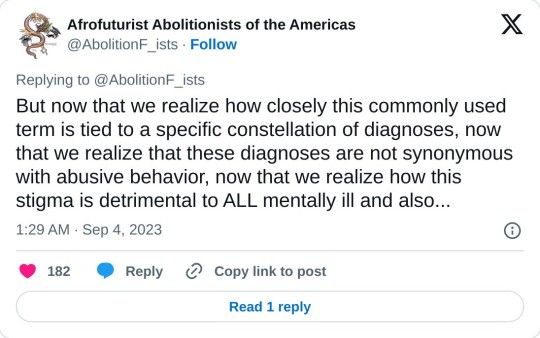

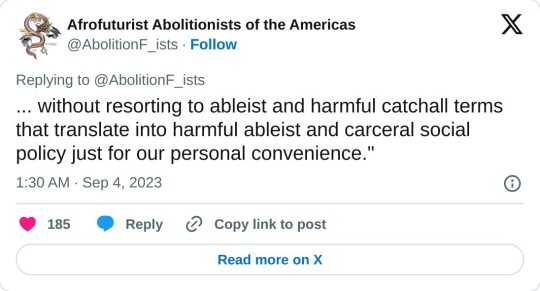
#repost of someone else’s content#twitter repost#NPD#narcissism#narcissistic personality disorder#pathologization#carceralism#saneism#narcissistic abuse#narc abuse
34 notes
·
View notes
Text
I use Foucault’s idea of apparatus to shift philosophical discussion about disability away from restrictive conceptualizations of it as a personal characteristic or attribute, a property of given individuals, an identity, or a biological difference; that is, my assumption that disability is an apparatus of productive power moves philosophical discussion of disability toward a more flexible conceptualization of it than other conceptions of disability provide, toward a conception of disability that is historically and culturally sensitive in ways that other conceptions of disability are not.
Disability is not a metaphysical substrate, a natural, biological category, or a characteristic that only certain individuals embody or possess, but rather is a historically contingent network of force relations in which everyone is implicated and entangled and in relation to which everyone occupies a position. In other words, to be disabled or nondisabled is to occupy a certain subject position within the productive constraints of the apparatus of disability. There are no “people with disabilities” and “able-bodied people”; rather, there are “disabled people” and “nondisabled people.”
Shelley Tremain, Situating Disabled Philosophers and Philosophy of Disability in Philosophy. [emphasis added]
70 notes
·
View notes
Text
Tell Me I'm Wrong
Here we are, scrolling Tumblr to find content relatable to how we perceive ourselves and are current underpinnings.
I am salty, for one. Outraged, for two.
In what world did we stop pathologizing ADHD and let it become "trendy" and "cool."
Hear me out.
As a student of the healthcare profession, I am beyond ecstatic that we have made headway into this avenue of accepting neurodivergents' wiring and predispositions.
What I am not a fan of, is how diagnoses like mine, bipolar type I, are still ostracized and considered crazy? When people with ADHD are celebrated for their differences.
I don't log onto the inter webs and see laughable memes about being bipolar, and how those unaffected all rally to support those we know who are living with bipolar disorder. There just isn't that community abound.
So exploring the internet yields results that some people's conditions are "better" or "more palatable" than others.
This particularly worsens when we see people antagonizing those with narcissistic or antisocial personalities.
Give grace where grace is due, and please calm down with associating diagnoses with stigmas.
Bipolar people are not crazy, and just because you cannot make up your mind--that doesn't mean you can throw around bipolar as an excuse.
Narcissistic people are not abusers, sure, anyone can be. But have you read about how this personality disorder actually develops, and the immense trauma these people have endured from a very young age? How it rears its ugly head is a manifestation of inability to parse through self and others, and how to accept their true core which they tend to avoid... because of the hurt they still carry in their hearts.
Hurt people hurt people.
Antisocials aren't all criminals, or murderers, or deserve to be locked up. Again, there is no reason to equate our biggest fear of some group of people with someone just because we're unfamiliar with it, or not well read. This puts them in a box where they don't feel safe, and can cause more trouble than do any good.
People are individuals, and people are more than their diagnoses.
You wouldn't fall down, sprain your ankle, and call yourself something inappropriate, like "now I'm crippled." And if you do, then you should really reevaluate your morals.
#mental health rant#bipolar disorder#bipolar I#npd#narcissistic personality disorder#cluster B#mood disorder#antisocial personality disorder#antisocial#aspd#stigmas#just please be a decent human#pathologization
23 notes
·
View notes
Link
“Vietnam’s Health Ministry officially confirmed on August 3, 2022, that same-sex attraction and being transgender are not mental health conditions, Human Rights Watch said today. The decision brings Vietnam’s health policy in line with global health and human rights standards.
Vietnam’s new directive states that “the American Psychiatric Association and the World Health Organization (WHO) have confirmed that homosexuality is entirely not an illness, therefore homosexuality cannot be ‘cured’ nor need[s] to be ‘cured’ and cannot be converted in any way.”
“The Vietnamese Health Ministry’s recognition that sexual orientation and gender identity are not illnesses will bring relief to LGBT people and their families across Vietnam,” said Kyle Knight, senior health and lesbian, gay, bisexual, and transgender (LGBT) rights researcher at Human Rights Watch. “LGBT people in Vietnam deserve access to health information and services without discrimination, and the Health Ministry’s new directive is a major step in the right direction.”
Vietnam has made some progress on LGBT rights in recent years, Human Rights Watch said. In 2013, the government removed same-sex unions from the list of forbidden relationships, but the update did not allow for legal recognition of same-sex relationships. In 2015, the National Assembly updated the civil code to make it no longer illegal for transgender people to change their first name and legal gender, but the revisions did not create a legal gender recognition procedure...
The Health Ministry issued the following instructions for all medical centers across Vietnam:
Enhance information propagation and dissemination so that the medical doctors, staff, and patients at medical examination and treatment centers have a correct understanding about homosexuality, bisexuality, and transgender people.
While administering medical examination or treatment for LGBT patients, health workers need to ensure gender equality and respect to avoid discrimination and prejudices against these groups.
Don’t consider homosexuality, bisexuality, and being transgender an illness.
Don’t interfere nor force treatment upon these groups of patients, if any, it must be in the form of psychological assistance and performed only by those who understand sexual identity.
Enhance internal review and inspection efforts for medical examination and treatment centers and practitioners to ensure compliance with the professional codes in medical services according to the law.”
-via Human Rights Watch, 8/18/22
#vietnam#lgbtq#lgbtq rights#homophobia#pathologization#human rights#ableism#transgender#trans rights#good news#hope#medical news#bisexuality
137 notes
·
View notes
Text

By: Abigail Shrier
Published: Dec 22, 2023
At age nine, Chloe Cole started early puberty. By age twelve, she was uncomfortable in her body; online influencers convinced her that she was in some sense really a boy. She came out to her parents as “transgender” and, not knowing what else to do, they took her to a therapist.
“They didn’t expect that by seeing a psychologist, I would just be funneled further and further into this pipeline,” Cole told a rapt audience at AmericaFest this week.
For Chloe, that pipeline meant puberty blockers at age 12 followed by cross-sex hormones. A medically unnecessary double mastectomy at age 15. By 16, she was filled with regret.
It’s easy to see this as one more ghastly entry in the macabre chronicles of gender medicine: incompetent therapists and unethical doctors deconstructing young girls’ bodies for reasons that seem alternately depraved, mendacious and confused.
But if you take a step back from the case of the detransitioners—young women shepherded into medical transitions they later came to regret—another image emerges. Not merely of therapists’ “affirming” teens’ transgender identity, specifically. But one more instance in which the Bad Feelings experts made adolescents’ bad feelings worse.
“[My parents] didn’t expect that by seeing a psychologist, I would just be funneled further and further into this pipeline,” Cole said.
Like a lot of teen girls who suddenly adopt a transgender identity, Cole’s mental health treatment preceded her gender confusion. She had been medicated for ADHD starting at age nine or ten—given escalating levels of stimulants that made her feel lousy and disconnected from her body and didn’t seem to help. She now believes ADHD was a misdiagnosis.
“In general, this model of making everything a condition—if a child is different in any way, if they’re not focusing in school, if they’re a little bouncy in class and they won’t sit in their seat—it takes the responsibility off of the adults to say, ‘Okay, let’s just medicate them. That’ll fix the problem,’” Cole told me.
Writing my last book, Irreversible Damage, involved extensive interviews with many detransitioners and American families in general. In the course of my research, I became aware of three things: First, that unprecedented numbers of American kids were undergoing therapy or on psychiatric medication. Second, that therapists’ diagnoses were often altering adolescents’ self-understanding. And, third, that large numbers of parents had become profoundly dependent on therapists to guide their parenting and “fix” their kids.
It wasn’t only ideologically-motivated “gender therapists” who were making mischief, reifying the idea in adolescents’ minds that they were really, truly transgender. Ordinary, well-meaning therapists were doing the same, not primarily for ideological reasons. Sometimes the therapists were simply following the guidance of their accrediting organizations. But just as often, affirming the adolescent – in place of treating her – was simply par for the course. That was simply what the therapeutic relationship with the teen patient had become.
Sure, I’ll call you ‘Sebastian.’ I can see why you feel Mom’s taking away your smartphone was emotionally abusive. Losing a beloved cat can be devastating; let’s talk about coping with your grief for the next few sessions. It sounds like having to move after seventh grade was traumatic.
This model of making everything a condition—if a child is different in any way, if they’re not focusing in school … it takes the responsibility off of the adults to say, ‘Okay, let’s just medicate them, ’ Cole said.
When faced with a surly teen who isn’t yours, one you must somehow keep engaged for a potentially interminable 50-minute hour, and for whose mistakes you bear no direct emotional consequences—it’s just so easy to validate their perspective. Her mother’s decision to take away the smartphone, her pet’s death, her parents’ move—how did they make you feel? Let’s talk about your pain, every week, for years.
The rising generation is swimming in therapy. Forty two percent of Gen Z—those born between 1995 and 2012—has been in therapy (more than any other generation). Forty two percent has a mental health diagnosis. One recent survey indicates the extent of diagnosis may even be more dramatic: 60 percent of those between the ages of 18 and 26 may have been diagnosed with an anxiety disorder.
Perhaps most alarming, by 2016—long before the Covid lockdowns and well before American kids aged 2 to 8 were even on social media—almost 20% of these little ones had a diagnosed mental, behavioral, or developmental disorder.
They are receiving unprecedented levels of mental health treatment. Curiously, they also seem to be getting worse.
For well over a decade, teachers and school counselors have assumed the mandate (and curricula, and use of instructional time) to play shrink indiscriminately with kids, often styled as “Social Emotional Learning.” Parents stopped trusting their own judgment and family traditions regarding childrearing, instead relying on shrinks to guide their parenting. And we all allowed our kids’ (largely normal) bad feelings to be pathologized by the those in the bad-feelings business.
Gen Z is receiving unprecedented levels of mental health treatment. They seem only to be getting worse.
Harrison Ford made this point nicely in an interview with the Hollywood Reporter, in February of last year. A reporter had said to Ford, “Your fans online have done some armchair diagnosis, looking at things you’ve said about being shy in social situations and some of your talk show appearances. Some assume you’ve wrestled with social anxiety disorder. Are they onto something?”
“Shit,” he said. “That sounds like something a psychiatrist would say, not a casual observer.”
For the rising generation, the language of psychopathology provides the lens with which they understand themselves and each other. Where my generation would “self-diagnose” with laziness or procrastination, the rising generation might see complex post-traumatic stress disorder or ADHD.
But while laziness can be obliterated by a change of attitude and habits, a mental health diagnosis demands treatment or accommodation. Trying to lift yourself out seems futile. And so, unsurprisingly, the generation lavishly labeled with mental health diagnoses also has the least faith in its ability to meet even routine challenges or turn their lives around.
“No. I don’t have a social anxiety disorder,” Harrison Ford told the reporter. “I have an abhorrence of boring situations. I was shy when I first went onstage—I wasn’t shy, I was fucking terrified. My knees would shake so badly, you could see it from the back of the theater. But that’s not social anxiety. That’s being unfamiliar with the territory. I was able to talk myself through that and then enjoy the experience of being onstage and telling a story with collaborators.”
“No. I don’t have a social anxiety disorder,” Harrison Ford told the reporter. “I have an abhorrence of boring situations. I was shy when I first went onstage. But that’s not social anxiety.”
A case of the fantods. To overcome those, Harrison Ford didn’t require an expert or a prescription. He needed only to summon the guts.
Imagine if he’d been born in 2012 instead of 1942.
==
You don't have a "gender," you have a personality.
You don't have a disorder, you've just never been told, "no."
This issue isn't exclusive to professional therapists. Tumblr and Twitter are filled with assholes who defend their assholery with self-diagnosed autism or "trauma." They're under the misconception that if they claim it's some kind of disorder, rather than them just being a colossal asshole, you can't complain, and they can do what they want. This also explains the multitude of "genders."
#Abigail Shrier#Chloe Cole#bad feelings#medicalization#gender ideology#queer theory#pathologization#psychology#gender affirming care#gender affirming healthcare#gender affirmation#affirmation model#therapy#religion is a mental illness
10 notes
·
View notes
Text
The Definitive Guide to Psychiatric Diagnosis: do it as well as any accredited psychiatrist by following these simple steps:
1. Regardless of who you are diagnosing or what symptoms they have reported thus far, flip to your favourite page of the DSM (V or IV or whichever version is your favourite/the one you're most familiar with, don't bother getting with the times unless you really want to).
2. There will be a checklist associated with your favourite diagnosis, go through this checklist and tick off the ones that feel right. Ask the patient relevant questions if you feel like it, but always remember that you know the patient better than they know themself, always.
3. Add up the check-marks, check to see if the number you get is high enough to qualify («the book» will tell you how many of the symptoms the patient needs to exhibit to qualify for the diagnosis, reference this number). If so, congratulations, you've just diagnosed your patient. If not, either assert they have the disorder anyway, or flip to your second favourite page of the DSM and start again.
4. Rinse and repeat as desired.
5. When in doubt, go with your gut, and never let anyone question your diagnosis/diagnoses, as this is always a direct attack on your personal character, and thus must not be tollerated.
Good luck, you are now as skilled as anyone "qualified" to diagnose mental health issues, now get out there and pathologize everyone! Or at least everyone you don't like and/or agree with.
#seriously#it's this bad for real#diagnosis#pathologization#antipsychiatry#dsm#dsm slander#apa#apa slander#don't forget to prescribe medication based on this and only this#and insist that the patient must take their meds always no matter if they help or how bad the side-effects are#this is why you shoild never trust people who are anti-self-diagnosis#self diagnosis#is good actually#you know yourself better than any so-called mental health proffessional#💐
11 notes
·
View notes
Text
Speaking as a system who is graduating in Psychology this very month (finally), Psychology is not the endorser of your moralism. Things aren't disorders or "mental illnesses" just because you find them cringe, icky or otherwise not normal enough to be around you, things are disorders when they significantly impact the person's life negatively, not your judgment.
You just want to pathologise what you don't like because you think if they are disorders then you can say "therefore they shouldn't have human rights or be allowed in society, we should kill them all or lock them up far away", which in turn is massively ableist, that's not the response you should produce to seeing disability.
So sorry, not sorry, but you'll have to share society and its spaces with people you find "cringe" or weird like nonhuman identity and plurality and whatever else, don't make it their problem.
#discourse#nonhuman#psychology#plurality#non disordered#moralism#pathologisation#pathologization#mental illness#disorder#disorders#mental disorders#medicalism#medical discourse#medical mechanism#medical institution#cringe#cringe culture#ableism#sanism
8 notes
·
View notes
Text
god i can't stand those posts like "people on the internet treat autism like it's cute. but it's actually not because i have trauma and i've done violence" like. the trauma is not a package deal with the behaviours that get called autism, you get that right? you get that the trauma is from the violent imposition of social control and not from the evil autism demon that makes you do bad things against your will? right???
4 notes
·
View notes
Text
maybe there is just nuance to pathologization, including times where it is appropriate and times where it is not
#pathologization#pathologization post#you know the one#and if you don’t#uh#idk send me an ask and i can link it
9 notes
·
View notes
Note
hey, i feel like an absolutely ill person. i don't have access to therapy but i am reading a lot about mental health and am very interested in it. i am not self diagnosing, the only thing i am sure i have is cptsd. but i see myself in so many illnesses. when they list symptoms and i realize, something i do or feel is actually a symptom and not normal, i feel less and less like a normal human. i feel like the most ill person, like nothing i do or feel is anything but a symptom. i am afraid to start therapy one day because i fear that they'll either a. confirm that i am that broken or b. say i have very little issues and am making it up.
it's not all bad, i am not as hard on myself anymore since i see what counts as "symptom", i don't blame myself for all my difficulties that much anymore. i am afraid it'll come out that i am actually healthy and just lazy and just used it as an excuse to be even more lazy.
i read a lot of articles about how the rise in self diagnosis actually are (in the eyes of the writer, idk if that's true) cheaply excuses for the peoples poorly perfomance, taking the responsibility for all faults from that persons shoulders and always blames the illness. and i am afraid that's what i do, that i don't blame myself when i fail but put it on "idk what illness i have but there is something".
i am simultaniously convinces i kinda have every illness there is and am beyond repair, and also that i have no illness at all and if i seek diagnosis people will know and blame me.
Hi anon,
While professional diagnosis is always recommended, not everyone can access or afford a diagnosis. There is an epidemic of pathologization that therapists and psychiatrists sometimes perpetuate - seeing your human behavior as "disordered" can not only come with stigma but looking at it that way can warp your idea of what "normal" means. When you're made to feel like aspects of yourself are "not normal" or "disordered" it's easy to feel broken and ashamed. Getting a professional diagnosis comes with its own stigma and it can be easy to feel like it defines you.
I think it's worth considering that there are therapists out there who actively work against pathologization and acknowledge your humanity instead of perceiving you through the lens of disorders and symptoms. My previous therapist told me he believes I have a particular dissociative disorder but explained that a diagnosis isn't necessary for treatment, and that I can still be treated for the disorder without an official diagnosis.
It's hard because many symptoms of different mental illnesses overlap, and this is partly what can lead to misdiagnosis, both personally and professionally. Many mental illnesses also interact with each other or intertwine, making it difficult to distinguish (like for example my BPD vs my PTSD). There's also debate about the validity of certain diagnoses and whether or not they're really just different expressions of PTSD. So it can often be hard to make a confident diagnosis.
I think it's also worth considering that the amount of mental illnesses someone has doesn't necessarily mean they have it worse. Some people may struggle immensely with a single disorder and others may function well with a laundry list of mental illnesses. Regardless, there are ways to cope with and manage every mental illness - there is always hope.
You're right that some people who self diagnose (or even those who are professionally diagnosed) will use their disorder as an excuse, instead of taking accountability, but it sounds like you're just trying to understand your own experiences and how to best get help.
If anyone would like to respectfully chime in please feel free to do so. Otherwise, I hope I could help and please let us know if you need anything.
-Bun
4 notes
·
View notes
Text
https://twitter.com/butchanarchy/status/1597981455254441985
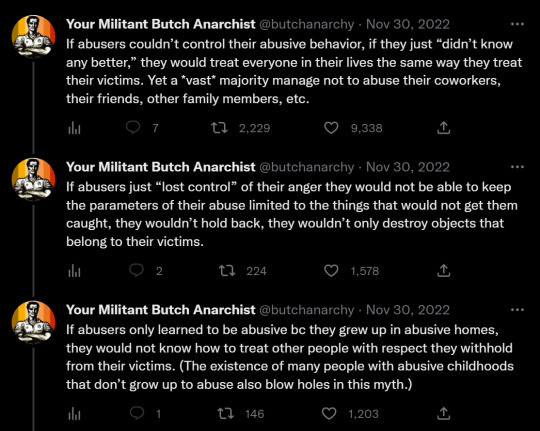

[image ID:
If abusers couldn’t control their abusive behavior, if they just “didn’t know any better,” they would treat everyone in their lives the same way they treat their victims. Yet a vast majority manage not to abuse their coworkers, their friends, other family members, etc.
If abusers just “lost control” of their anger they would not be able to keep the parameters of their abuse limited to the things that would not get them caught, they wouldn’t hold back, they wouldn’t only destroy objects that belong to their victims.
If abusers only learned to be abusive bc they grew up in abusive homes, they would not know how to treat other people with respect they withhold from their victims. (The existence of many people with abusive childhoods that don’t grow up to abuse also blow holes in this myth.)
Abusers give themselves permission to be abusive because they believe they are justified in doing so, in using power and domination to control the people they think they have a right to control. That is why their abuse is not consistent with everyone.
Which people abusers believe are acceptable to abuse is ideologically dependent. Many are taught within the dominant culture that one’s romantic/sexual partner(s) and one’s children are acceptable objects of control. Abusers take this belief to its logical conclusion.
/end image ID]
#repost of someone else’s content#twitter repost#butchanarchy#abuse#pathologization#authoritarianism#important#FAQ
98 notes
·
View notes
Note
what are your thoughts on the asd level system in replacement of functioning labels?
the euphemism treadmill rolls on. to claim that "levels" are somehow a purer, more "objective," and less reductionistic way of measuring ... degree of autism? distance from "normalcy"? proximity to neuronormative demands? is honestly insulting. like any other description of super-generalized "support needs," it has little bearing on the lived realities of actual autistic people.
as always, i advocate deep listening, specificity, and openness to change in conversations about what all of us as autistics want and need. generalized labels do the exact opposite of this, fixing us in place in relation to highly arbitrary and oppressive cultural tropes of functionality, productivity, and intelligence. i want to be understood as a whole person, not as something whose deviance can be quantified by medical authorities.
plus like...this shit was designed by the dsm. why on earth are we behaving as though the apa designs anything with the best interests of ND/Madppl in mind. levels, like all other formalized ways of seeing/marking autism, are designed with the ultimate goal of ameliorating rather than celebrating difference.
35 notes
·
View notes